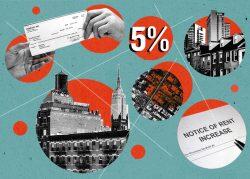After a year of unpaid rent and rising property taxes — what one landlord called “the American Hell” — a group of small property owners is pushing the Rent Guidelines Board to approve a hike on stabilized apartments.
But the advocacy campaign, launched Tuesday by the Small Properties Owners of New York, has no fiscal backing. Instead it will rely on letter-writing and landlord testimonies.
SPONY member Jan Lee said the campaign, dubbed “RGB Responsibility,” would be a volunteer effort by the group’s small property owners, most of whom have a few dozen apartments.
“There’s nobody funding it,” said Lee. “It’s just us as families reaching out as an organized group of people to our elected officials.”
In New York, a professionally run advocacy campaign can set an organization back anywhere from tens of thousands to millions of dollars — $10,000 a month for lobbying, another $10,000 to drum up press; and perhaps $35,000 to run a week of ads in a political newsletter read by elected officials. A TV blitz can cost $1 million a week.
Read more


SPONY’s tax filings show the nonprofit hasn’t reported annual revenue above $50,000 in the past 12 years. Experts say that makes it extremely challenging to make an impact.
“Unless an organized effort has the ability to use star power or massive grassroots appeal, with a significant amount of free media to back it up, it is very tough to influence opinion or move the needle,” said Jake Dilemani, a managing director at public affairs firm Mercury.
SPONY’s main focus will be the public hearings hosted by the Rent Guidelines Board next week. The campaign will recruit and prepare small owners to speak about their experiences ahead of the Tuesday and Thursday town halls, where tenant advocates will also weigh in.
The group’s members argue that small property owners deserve some of the attention that tenants have garnered for their financial struggles during the pandemic.
“The hardship is not exclusive to one side,” said Lee. “The hardship is reflected on us as well.”
Landlords at Tuesday’s press conference lamented having to finance repairs and pay bills with no income from rent.
Others criticized the RGB’s formula for calculating annual increases, saying it excludes certain expenses, such as maintaining aging infrastructure.
“Our oldest buildings were built in the 1850s when Millard Fillmore was president,” said Brooklyn landlord Christopher Athineos. “So they require a lot more expense.”
Athineos said he’s gunning for a 2 percent increase on one-year leases and 3 percent on two-year deals, which other members echoed.
A preliminary vote by the rent board recommended a zero to 2 percent hike on one-year leases and 1 percent to 3 percent for two years. Last year, the board froze rents across the board in response to the pandemic.
The final vote will be held the evening of June 23.
